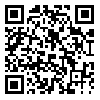BibTeX | RIS | EndNote | Medlars | ProCite | Reference Manager | RefWorks
Send citation to:
URL: http://sjsph.tums.ac.ir/article-1-5114-en.html
Background and Aim: Work ability reflects the interactions among personal characteristics, working conditions, employees' functional capabilities, and also employees' health status. Hence, the aim of the present study was to provide the Farsi version of Work Ability Index and to validate it among Iranian workers.
Materials and Methods: In the first stage, Backward Translation method was used for linguistic validation of the questionnaire. Cross sectional survey of a sample of 645 workers from some Iranian companies were conducted. The study estimated the reliability of the questionnaire by means of test-retest, as well as the construct validity using factor analysis. In order to determine discriminant capacity, the mean scores of different dimensions of work ability index were compared between workers with and without sick leave.
Results: Accordingly, the questionnaire showed a good internal consistency. ICC coefficients for the questionnaire were acceptable. Moreover, factor analyses related to the questionnaire items indicated that only one question is sufficient for each item of "work ability in relation to the demands of the job" and "mental resources". Also, questions related to the item of "number of current diseases diagnosed by physician" can be integrated in six questions. A good level of discriminant validity was observed for all dimensions except for the item of "work ability regarding work demands".
Conclusion: According to the acceptable validity and reliability of Work Ability Index, obtained in the present study, using this questionnaire for evaluating workers' work ability in all Iranian work environments, especially in industrial settings, is recommended.
Received: 2014/07/9 | Accepted: 2014/07/9 | Published: 2014/07/9
| Rights and permissions | |
 |
This work is licensed under a Creative Commons Attribution-NonCommercial 4.0 International License. |





